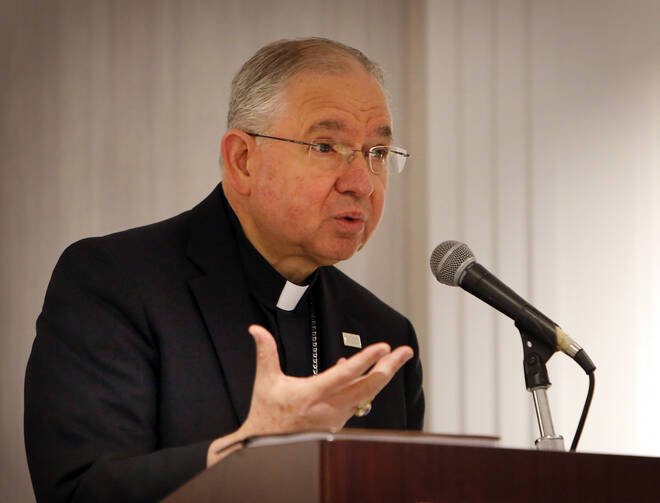So you think America began with the Pilgrims? Think again.
In a speech last week, Archbishop José H. Gomez of Los Angeles said that centuries before English Protestants arrived on the East Coast in the 17th century, Catholic missionaries from Spain and Latin America landed in North America. They brought with them Spanish language and culture—a fact, he said, that should have bearing on the U.S. debate about immigration reform.
“There has been a Hispanic presence and influence in this country from the beginning,” Archbishop Gomez said during a Sept. 9 gathering at Boston College. “We need to recover this ‘forgotten’ history.”
The nation’s highest-ranking Hispanic prelate, Archbishop Gomez has long championed immigration reform that keeps families intact and normalizes the status of the nation’s estimated 11 million undocumented immigrants.
He reiterated those calls in Boston, calling immigration reform “a struggle for justice, dignity and human rights” and “a test of our faith, our humanity and our compassion.”
Archbishop Gomez, who emigrated from Mexico to the United States, said he is “disturbed” by the tenor of the debate over immigration and said blame is found “across party lines.”
“There is a streak of nativism and racial discrimination that has always run through our history,” he said. “It seems to flare up especially in times when people are fearful and uncertain about the future.”
“I think we are in one of those periods in our history again today,” he continued.
Americans have expressed unease about the economy in recent years. A Marketplace-Edison Research poll from July, for example, found that three in 10 Americans reported losing sleep over their finances and seven in 10 say the economy is rigged in favor of certain groups.
Archbishop Gomez said that as a pastor, he takes those concerns seriously, but he urged Americans not to blame the estimated 11 million undocumented immigrants for their anxiety.
“But also as a pastor, I have to say that I’m worried about something else that I see,” he said. “I’m worried that in our fear we are closing in on ourselves, we are hardening our hearts. There is a cruelty in our policies and our public rhetoric.”
The leader of the nation’s largest Catholic archdiocese also rejected so-called touchback immigration proposals, which would grant legal residency to undocumented immigrants only if they pay fines, return to their countries of origins and apply to enter the United States legally.
Republican White House hopeful Donald Trump has suggested he would back something akin to this plan, as has his running mate, Indiana Gov. Mike Pence.
“That sounds reasonable and fair,” Archbishop Gomez said. “The reality is that it can take more than 10 years to get into this country legally because our immigration system is so broken and backward.”
“So in effect, we’re asking people to make an almost inhuman choice,” he continued. “We’re asking them to separate themselves from their children, their loved ones—for maybe a decade or more.”
“Is that the kind of justice we want?” he asked. “We need to put ourselves in the position of these people. What would we do if we were faced with that kind of a choice? Would we follow a law, if it means maybe never seeing our families again?”
The Hillary Clinton campaign, meanwhile, has said it plans to introduce legislation within the first 100 days of a Clinton presidency that would carve a pathway to citizenship for undocumented immigrants, without the need for immigrants to leave the United States.
Archbishop Gomez said that despite the challenges, he remains hopeful.
“The good news is that the American people are far more compassionate and understanding than some of the loudest voices we are hearing today,” he said.
Further, he said, “we have a consensus in public opinion for immigration reforms that would be meaningful, just and merciful.”
Polls seem to bear him out. A Public Religion Research Institute/Brookings Institution survey from earlier this summer found that most Americans favor immigration reform that includes a pathway to citizenship and rejects the idea of building a wall along the U.S.-Mexico border, another Trump proposal.
“What we are waiting for,” Archbishop Gomez concluded, “is politicians and media figures who have the will and the courage to lead.”
Michael O’Loughlin is the national correspondent for America. Follow him on Twitter at @mikeoloughlin.








Mr. Honda, our comments policy, especially points 2 (be brief), 5 (use your own words), and 6 (choose your spots) mean that the 5 additional comments you posted beyond this first one were excessive; we've removed them. Thanks for your attention to the comments policy in the future.